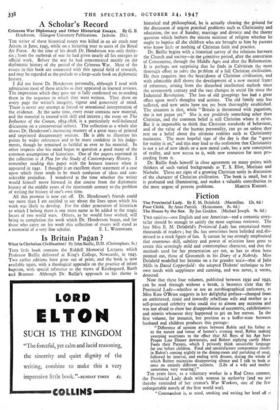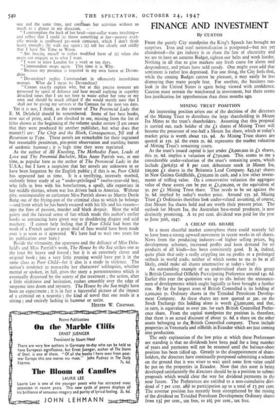Fiction
The House by the Sea. By Jon Godden. (Michael Joseph. 9s. 6d.)
Two satirists—one English and one American—and a romantic story- teller should be enough to satisfy the most captious reviewer. The late Miss E. M. Delafield's Provincial Lady has entertained many thousands of readers ; but §he has sometimes been belittled and.dis- missed as a stock figure of fun. It cannot be too strongly emphasised that enormous skill, subtlety and power of selection have gone to create this seemingly mild and commonplace character, and that the methods used for her presentation are not, as has so often been pointed out, those of Grossmith in his Diary of a Nobody. Miss Delafield modelled her h&oine on a far grander scale—that of Julia Mills in David Copperfield: she adapted Dickens' technique to her own needs with suppleness and cunning, and was never, it seems, detected.
Now that these four volumes, published between 1930 and 1940, can be read through without a break, it becomes clear that the Provincial Lady—whether or not an autobiographical caricature, as Miss Kate O'Brien suggests in her delightful preface—changed from an embittered, timid and inwardly rebellious wife and mother to a self-possessed celebrity who could rise to almost any occasion and was not afraid to show her disapprobation of eccentrics, exhibitionists and nitwits whenever they happened to gel on her nerves. In the first volume, for instance, her position as a buffer-state between husband and children produces this passage:
" Difference of opinion arises between Robin and his father as to the nature and venue of former's evening meal, Robin making sweeping assertions to the effect that All Boys of his Age have Proper Late Dinner downstairs, and Robert replying curtly More Fools their Parents, which I privately think unsuitable language for use before children. Final and unsatisfactory compromise results in Robin's coming nightly to the dining-room and partaking of soup, followed by interval, and ending with dessert, during the whole of which Robert maintains disapproving silence and I talk to both at once on entirely different subjects. (Life of a wife and mother sometimes very wearing)" Ten years later, as a voluntary worker in a Red Cross canteen, the Provincial Lady deals with woman in authority (and we are thereby reminded of her creator's War Workers, one of the few unforgettable novels of the first world war).
"Commandant is, as usual, smoking and writing her head off at one and the same time, and conenues her activities without so much as a glance in my direction. - " I contemplate the back of her head—coat-collar wants brushing— and reflect that I could (a) throw something at her—nearest avail- able missile is cardboard gas-mask container, which I don't think heavy enough ; (b) walk out again ; (c) tell her clearly and coldly that I have No Time to Waste.
" Am bracing myself to rather modified form of (c) when she snaps out enquiry as to what I want.
" I want to leave London for a week or ten days. " Commandant snaps again. This time it is Why.
" Because my presence is required in my own house in Devon- shire.
" Devonshire? replies Commandant in offensively incredulous manner. What do I mean by Devonshire?
" Cannot exactly explain why, but at this precise moment am possessed by spirit of defiance and hear myself replying in superbly detached tones that I am not here to waste either her time or my own and should be much obliged if She would merely note that I shall not be giving my services at the Canteen for the next ten days.
Yet it is not, I think, as the creator of The Provincial Lady that E. M. Delafield should be remembered. Some of her best books, now out of print, and, I am shocked to see, missing from the list of titles shown at the beginning of the volume under review (I am aware that they were produced by another publisher, but what does that matter?) are: The Chip and the Block, Consequences, gill and A Reversion to Type. These novels are remarkable for their ingrained but reasonable pessimism, pin-point observation and startling bursts of sardonic humour ; it is high time they were reprinted.
As the author of All Kneeling, The Methodist Faun, Loads of Love and The Perennial Bachelor, Miss Anne- Parrish was, at one time, as popular here as the author of The Provincial Lady in the U.S.A.; but I have a suspicion that her novels are unknown-to or have been forgotten by the English public ; if this is so, Poor Child has appeared just in time. It is a terrifying, intensely morbid, violently bitter study of an " under-privileged " twelve-year-old boy, who falls in love with his benefactress, a spoilt, idle expatriate in her middle thirties, whom war has driven back to America. Without pity, sentimentality or caricature Miss Parrish shows us Martin Doyle flung out of the frying-pan of the criminal class to which he belongs —and from which he has barely escaped with his life and his reason— into the fires of passion, murder and black despair. Here the wild gaiety and the farcical sense of fun which made this author's earlier books so entrancing have given way to shuddering disgust and acid mockery. (I cannot help feeling that if Poor Child had been the work of a French author a great deal of fuss would have been made over it as soon as it appeared. We have had to wait two years for its publication over here.) Beside the virtuosity, the spareness and the delicacy of Miss Dela- field's and Miss Parrish's work, The House by the Sea strikes one as the least bit heavy and forced ; but it is an extremely clever and original book ; just a very little pruning would have put it in the same class as Poor Child—for it also is a study in violence. The author's tendency to transcribe her characters' soliloquies, whether mental or spoken, in full, gives the story a portentousness which is eventually dispersed by the surety of the treatment ; the action, after a little stickiness and hesitation, rushes smoothly over the edge of suspense into doom and mystery. The House by the Sea might have been an experiment ; it is in fact a successful picture of the impact of a criminal on a neurotic ; the kind of novel that one reads at a sitting ; and entirely lacking in humour or satire.
HESTER W. CHAPMAN.

































 Previous page
Previous page